Summary: I live as someone experiencing homelessness, try to get help, and work on building relationships. People have repopulated the area of Tent City destroyed by the flooding. And we had one of our best turnouts at the Cadillac Motel.
Read Time: Approximately 20 minutes.
We’ve conducted our outreach on the last Saturday of every month for years now. We made an exception in March and moved the date to the 22nd due to several family-related issues affecting our team members.
As always, we started at the Cadillac Motel. Many people were lined up, and we had a vast number of provisions available for them. We had canned food, hygiene, suitcases, and the last of our winter clothes. The people who take care of pets are there, handing out food for them. As far as numbers go, it’s one of the largest turnouts we’ve had here.
A lady in line politely asks if we have any sandwiches or a meal she could eat while waiting, as she is hungry. I wish we had those resources, but all we have to offer is non-perishable food. What she doesn’t know is I had just received a call from a friend of mine at Matthews Table Church. They have hot food available, left over from their Men’s Breakfast, and had agreed to deliver it to us. Yes, I will take the crumbs from the master’s table anytime!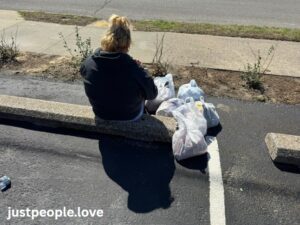
Before long, people are sitting down on the concrete parking curbs with the goods they had collected, eating a hot meal. That’s not a coincidence. That’s God’s will.
We arrive at Tent City. There are about twenty people here. One of them is a young girl. She is not wearing shoes. It was her first day there at Tent City. I was told her companion was down at camp attempting to build a shelter. Neither of them had anything but what they were wearing. She has that deer-caught-in-the-headlights look. This is a desperate situation.
I grabbed her an empty tote with a lid and explained how they would need a way to keep their clothes dry and food from the rodents. She said, “I can’t carry anything.” I didn’t ask why but assured her we would find a way to get it where it was needed. I stand in line with her and select items for her that I know they will need. Duct tape and tarps to start. I suggested that she pick out her own shoes and feminine hygiene while I went to check on someone else. The next thing I know, she’s gone, but the tote is still there.
I caught up with her on the long walk back to camp. She’s empty-handed. I pleaded with her to come back and reiterated that I would personally carry whatever she needed back to where they were staying. I’m not sure if there might be something mentally going on. One of our team members and I followed shortly thereafter with a loaded tote.
They have chosen to stay in the area of the Tent City that was recently devastated by the flood. The area resembles the impact zone of a jetliner. There’s debris everywhere, some of which got caught high in tree branches as the water receded. The ground that we are walking on has the occasional splotch that would support our weight, as it has yet to dry out. Her companion is struggling to pull a tarp from the mud. Again, they have nothing. She’s proud of herself that she found a way to get all of the things we had collected in the tote, including food. He’s elated. He thinks they’re going to be okay now and reminds her that she should have had the faith he told her to have.
But I know in my mind that there’s no way they’re going to make it. After a while, I suppose I’ve become numb to seeing people suffer. Occasionally, it occurs to me that I no longer react emotionally to it, and wonder if that’s okay. Later that evening, when we got home, this imagery caught up with me, and I fell apart, weeping—most of the night. I had someone attempt to take them a tent the day after, but they were both already gone.
Months ago, it was placed on my heart to experience homelessness, which was not something that I wanted to do. Honestly, it scared me to death. Know that everything you’re about to read was done of the belief that if you are doing God’s will, he will provide, protect, and or make a means of escape available. Without keeping that in mind, it’s not going to make as much sense.
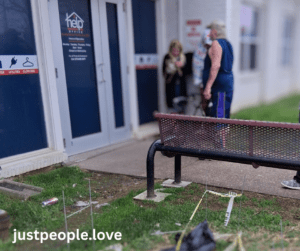 My wife drops me off around the corner of the Help Office. I have a backpack. I have a mat to sleep on, rain gear, boots, a recharging battery, knives, flashlights, some freeze-dried food, an electric kettle to boil water, and the ability to start a fire. And a cardboard sign I will end up carrying around that day. Against the advice of mentors, I am unarmed. I am allowing myself one ordinary water bottle, which I hope to replenish throughout my outing.
My wife drops me off around the corner of the Help Office. I have a backpack. I have a mat to sleep on, rain gear, boots, a recharging battery, knives, flashlights, some freeze-dried food, an electric kettle to boil water, and the ability to start a fire. And a cardboard sign I will end up carrying around that day. Against the advice of mentors, I am unarmed. I am allowing myself one ordinary water bottle, which I hope to replenish throughout my outing.
My objective today is to seek help as a man experiencing homelessness. I have very low expectations, having been led to believe that the process was exhaustive.
People were waiting outside the Help Office, which, according to the sign on the door, was about to open. It’s cold and windy. One amputee sits upon his walker and shakes the locked door. Another girl is there for clothes. We are told by a couple of men unloading some shelving from a trailer that they will not be open that day. The man continues to shake the door, determined that it’ll open. Another man, covered in a thin sheet, angrily stomps off, stating that he wished he had known before he made the forty-five-minute trip to get there.
I head on foot to Saint Benedict’s, a homeless shelter for men. I walked in and sat down at a community table with other men, most of whom had their faces buried in their phones. I sit there waiting for someone to ask me for identification or prompt me to fill out some forms. But nobody said anything to me. I was free to move about. I was able to use the bathroom and refill my water bottle. I offered to help fold some laundry, which was politely accepted. I thought that would be a good way to fit in, but there was no need to.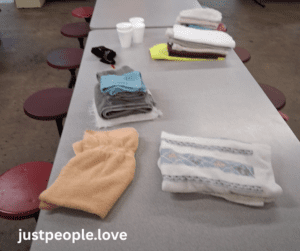
I was shocked. I could have charged my phone, taken a shower, and probably washed my clothes. I could have poured a cup of coffee, eaten a snack, and watched television in a warm, dry space. And nobody would’ve said a thing. Not what I was expecting.
I’ve grown a beard and haven’t cut my hair in several weeks; it’s looking a bit shabby. I wanted to deny myself the comfort of grooming so that I could better experience what it would feel like. However, it had what I initially thought was a significant bonus. People did not recognize me. I’ve already met a couple of men who should know me, but I’m not where one would expect to find me.
I find myself standing outside, struggling to get this monstrous backpack back on. A tall man in brown overalls approached, accompanied by his beautiful dog. The man has an unlit cigarette hanging from his mouth, with something dripping of its end. He stops, and we talk for a while. He is much dirtier than I, but his dog is very clean. He asked me to watch her as he went inside. The dog was obviously distressed that his friend was away and was relieved to see him again. He mentioned that he couldn’t stay anywhere, like the shelter, because of his dog.
I guess I didn’t think about it before, but if you’re alone in a world that ignores you, these companions might be the last thing you’ve got to hang onto. I don’t see any hope in this man’s face. I do see his brokenness. Desperation.
Next, I’m on my way to the Pitino Shelter, but on the way, I stopped by the exclusive Saint Stephens Catholic Cathedral. I have a chip on my shoulder, and I’m looking for trouble. Instead, I walked right in, took off the heavy backpack and my hat, and placed my sign on the floor where the cameras could clearly see it. And nothing happened. I genuflected as if I were a devout Catholic, knelt at the altar, and spoke to my Savior for a while. Unbelievable. Now, my behavior in seeking confrontation with the church seems childlike.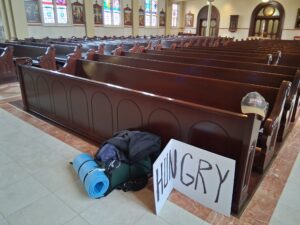
I walked into the basement of the Pitino Shelter to a room full of people, about thirty. A woman, obviously in charge, instructs me to leave the backpack at the door. Wait, I’m going to leave my means of survival here? An old man, who likely has more experience than I do, kindly instructs me on where to sit, for which I am grateful. I’m sitting across a man I saw at Saint Benedict’s. I’m seeing a few men from there. We’re all here for a free meal.
In short order, we all stand, and the lady in charge says grace, and before you know it, I have a meal in front of me. Nobody has asked me anything. Several of the people around me have boxes with food that was handed out before my arrival. Sandwiches with yellow stickers, denoting their undesirability from the general public, have become a welcome meal for later for someone who didn’t present identification or fill out any forms. Again, I’m just blown away.
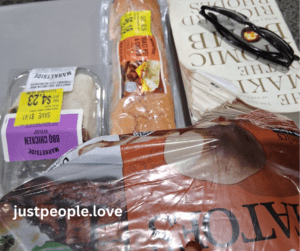
It’s not all fun and games. The family eating at the table next to me is having their last meal because their new place to live is about ready. I don’t know how long she and the three children had been living there. The man sitting across from me. He won’t make eye contact with me, but he seems so broken. I see mostly pain and hurt in the faces around me. I’ve not been around this many people packed this tightly, all anxious about food. There may have been a concern about whether one would receive their share. However, there seemed to be enough, although not by far.
Unfortunately, there is no bathroom. I’m told the privilege was abused and taken away. What do you do if you have got to go? I don’t know what I would have to go through to stay here, but I have other destinations in mind.
From there, I decide to pack up and walk downtown to panhandle with my sign. On my way, I realized that my zealous obsession to stay hydrated had a forgotten tradeoff. I needed to go. About that time, I came across a construction site with a port-a-potty. For the rest of my trip, I started to take note of these. Not something one would typically be watching out for.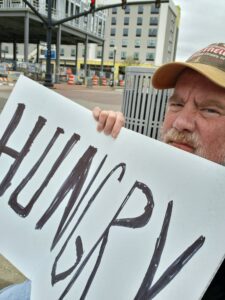
I sit down on the sidewalk at the intersection of Locust and Second Street, which has a traffic light. My white cardboard sign reads, “Hungry.” It was essentially what I expected. People drive by and try not to make eye contact, which is what I do when someone is at an intersection with a cardboard sign. I sat there for a while, just letting that soak in. I need help, but nobody seems to care. A lady then pulls over, apparently having circled the block, gets out of her car, and hands me a five-dollar bill. What is happening?
I decided to step up the game a little and walked down to the courthouse. There are deputies there; indeed, I will be asked to leave. I sat on a bench at the corner of Frederica and Third Street, holding my sign—more of the same. I recognized a pastor I knew making a turn at the corner in his vehicle. I held up the sign high and waved it around to get his attention, but he refused to look at me. I don’t blame him, and neither would I if I were him. A man walking by pulls out his wallet and gives me a five-dollar bill. You’ve got to be kidding me. Next, a car pulls us over, and a young man hands me a Dairy Queen bag with two cheeseburgers, fries, and a drink. All right, this must stop. I’m just deceiving decent people. I have had more to eat today than I would typically consume, and I have ten dollars to last me the rest of the day easily. I believe I’ve made my point.
I walk into the courthouse and utilize the public facilities. The wheelchair accessible stall has a welcome hook for me to hang my backpack from. A deputy walked in, conducted his business, and said nothing other than “Hey”, despite my gear and cardboard sign. People waiting in a long, miserable-looking line for vehicle registration try not to acknowledge my presence as I walk to the exit, except for the children. A young boy, probably five, is being led by the hand of his father, and he is fascinated with me. He has yet to be programmed.
I start walking to the Midtown Building. I’m going to visit the Welcome House. I am told they will allow people experiencing homelessness to enter their office and assist them in finding housing. We have been working with some people there, and I am anxious to see how I would be treated if I were unrecognizable to them. I had to quickly stop because the person assisting me had started the process to help me find a place to live, and I had to reveal my identity. To confirm my findings, as I walked toward the bus stop, I noticed a bicycle with a homemade cart. In the cart was food with the familiar yellow sticker. I waited and talked to the man who owned it. He didn’t have a place to live and was there to take advantage of the offerings, but he didn’t specify what that was. I didn’t want to press.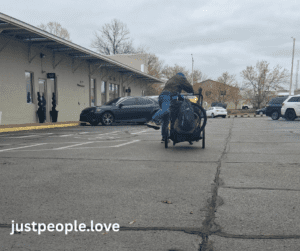
I missed the bus by moments. I prepared myself for the cold and sat on an open bench. I see my reflection in the reflective glass of the old Baskin-Robbins plant and notice that the pouch holding my rain gear is missing. Good to know, not having that gear is a game-changer. A man much older than I, who was at the Pitino Shelter earlier that day, walked by, and I thought it was interesting how he had managed to get around. The bus comes around every forty-five minutes. I boarded the bus and confidently handed the one-day bus pass I had previously purchased to the driver. It’s expired. But she allows me on anyway. Maybe it was the sign. The inside of the bus is warm, and when in motion, it squeaks and rattles like an amusement ride.
Like most members of the homeless community living in the city, I have chosen to take advantage of some of the benefits available to the public. I plan to walk from the bus stop to a local restaurant that I know is community-friendly. On the way there, I find another port-a-potty and an abandoned shopping cart that I throw my heavy backpack into and sign into. Now it makes sense. I pushed it for about a mile.
I spent the rest of the afternoon at this restaurant. For an overpriced cup of hot water, I’m allowed to hang out in a warm dry spot, charge my phone, refill my cup as many times as I want, and clean up in the bathroom. Another woman there whom I know from the homeless community is doing the same. Thankfully, she doesn’t recognize me either, since she likes to talk—a lot.
Ironically, I am eating a freeze-dried meal I had prepared in my electric kettle in a restaurant where other people are eating restaurant food. I get some looks, but nobody bothers me. I’m not dirty and smelly enough for people to care. Yet. It would have been tempting to use the ten dollars to buy something. But that’s not what I am here for.
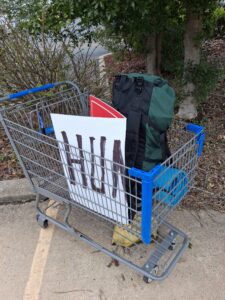
Later, I pushed the cart back to camp, which was an enclosed cargo trailer. I climb in and secure the door behind me with a ratchet strap. My first choice was to camp on one of the two rooftops of buildings I had previously selected. However, the temperature was expected to dip into the thirties that night, and there was some wind to contend with.
The trailer sounds like “cheating”, and I would have to agree. Having given it considerable consideration prior, I decided that if I were going to be homeless, I was going to use the same brain and figure out the best shelter. If I were actually without a home to live in, this is what I would’ve done.
I woke up cold. The very first thing that came into my mind was this. How is someone who is living like this expected to have faith or hope? One thing that wasn’t helping was that I wasn’t feeling God’s presence. I thought this would be different.
I brushed my teeth and spit into the bucket of urine I had accumulated overnight. Not a wise choice, as the gag reflex kicked in, spewing the toothpaste everywhere. I slept better than expected. I made the final decision to move forward with my plan to spend the day at Tent City. I figured that the day before, I dedicated myself to seeking help, which I did. My second objective in this outing was to develop relationships. So, I packed a smaller backpack with the bare essentials and caught the bus after a bathroom break at a local store.
After changing buses, I arrive about a mile away and continue the rest of the way on foot. My right foot isn’t doing as well at this point, and it’s starting to hurt. I had a choice in the weeks leading up to this: I could focus on physical therapy or self-defense. Having walked great distances on our outreach before, I knew what the consequences would be, and I was happy to accept them rather than not having some basic skills for staying alive.
I stopped for a moment to relieve myself, then sat down to think about whether this was really what I wanted to do. I’m realizing my error in judgment with the lack of fresh water, as I only have less than sixteen ounces and have failed to bring my means of filtering water in the wild. I’m hungry, but that’s the least of my concerns. I don’t know if the residents might take advantage of me being alone.
I question whether this was God’s will. Was I being obedient, or was I a 57-year-old man acting foolishly?
I decided to press on and entered one of the subdivisions. One of the first things I notice is that there’s a dumpster there. It’s beat up and dented, but it was not here before. Maybe it was, and I didn’t notice. I do take it as a hopeful sign. We received reports from multiple sources indicating that law enforcement had visited and given notice to the residents to vacate within twenty-four hours. That was over a week ago. I hope our local government listened to the community’s objections and reconsidered the decision. Perhaps the dumpster is an opportunity for people living here to give themselves a second chance to clean up their surroundings. Most of the campsites in this area are abandoned, likely due to the threat of being forcibly removed.
Two remain. The first home I came across belonged to a man. The roof was cleverly created with a liner for a swimming pool and built into the side of an embankment. There’s a steady stream of smoke trickling from the roof. He told me he had been experiencing homelessness for about twelve years. He pointed out several depressions in the adjacent embankment where he had lived, leaving me the impression that he had worked up to this.
I ask him where he got his fresh water. He said that he didn’t, but offered me a Coke.
His neighbor’s home belongs to a woman who doesn’t want to socialize at the moment.
I walk into the only other remaining subdivision, which is being repopulated after being destroyed by a flood. Ironically, as I stood there, I was aware of the impending forecast of more devastating flooding. They’re aware of it as well, but there’s no sign of concern. Besides, where are they going to go?
Everyone is getting up for the day. There’s about twenty people here. One man builds a fire outside his home as his significant other is fishing. A long-term resident, whom I would refer to as the mayor, walks about the neighborhood, introducing me to the new residents. He’s eating a combination of noodles and meat from a bag once used for frozen fish, with a fork borrowed from a neighbor. He asked me if I wanted a bite. I was hungry, and part of me wanted to accept his invitation as a sign of my acceptance. This is one of the few residents I trust. But the dark side of me said, “You can’t do that”. If I was going to hang out here for a while, I couldn’t take a chance on what that might do to my digestive system.
Another man here with whom I’ve developed a good rapport has rebuilt his home. However, this is an actual structure, with a door like the ones you and I have. On the inside, there’s a metal barrel attached to a chimney. It’s very warm. Something is going on; there’s another person. But a part of me doesn’t let me look.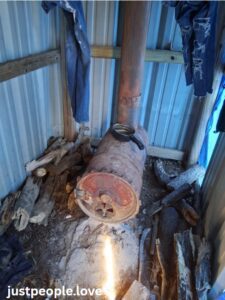
He questioned me on why I was there. When I explained that I was staying in the back of a trailer, he thought I would be better off in a home there that he said he would prepare for me. Here’s what’s really important to take away from this. See how I have arrived with nothing to offer, and I have been offered food, drink, and shelter by people who barely have anything themselves.
While I had prepared myself to sleep outside if my trailer plan fell through, I couldn’t say that I’m strong enough to sleep in a tent next to a bunch of strangers. I don’t care who they are.
I saw many familiar faces, as well as some new ones. Took time to talk with most of them. I’m asking everybody about fresh water. Everyone is telling me that I have to pack it in; there is no source. I’m not so concerned with myself; I’m just curious. You and I walk up to our refrigerator and dispense a glass of filtered water without thinking. We bathe in it, so plentiful.
The mayor introduced me to a man I had seen before but hadn’t had the chance to get to know. He has two fishing poles, and I asked if I could join. On our walk, unfortunately, a couple of them chose to stop and entered into a home with others. After sitting there alone for a while, I decided that was my cue to leave that subdivision and head for the other.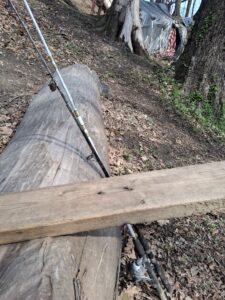
I get it. Get high in the morning, and let that set the tone for the rest of the day. Of course, it adds an element of danger. Unpredictable behavior. All it takes is a change of attitude, and things could take a quick turn.
I head back up toward the entrance and sit on a slab of concrete, reconsidering what I should do next. A couple walked past me on their way home, and it was as if I were invisible. Even those experiencing homelessness ignore me. It’s like I was sitting on Second Street with a cardboard sign. It’s slightly comical and somewhat humbling.
So, I pray. I tell God what He already knows. I don’t want to be there, but I am trying to be obedient. I prayed that if I were supposed to return and socialize, then I would do that, happy to accept the consequences. And that if I were not supposed to stay, to please give me a sign. I sat there in the sun, thinking about how this had not turned out to be the supernatural spiritual experience that I had hoped for. It’s a whole different ball game when you’re handing out things for free; people are glad to see you.
Within a few moments of that prayer, one of the men who had entered that tent stood before me, out of his mind. With me seated, this man enters into my personal space, which is not the defensive posture I would like to be in. He’s not my immediate concern; his pants are around his knees. Several other people arrive on the path, coming and going. It suddenly occurs to me that at least three of the people here are likely as high, sadly. And then this man, who is not in good shape, and I are now standing there. Fear washes over me, and I have the notion that I am supposed to leave.
But it was later realized that the potential for things to go wrong had presented itself. In the event of a verbal or physical altercation, I couldn’t control what others in the crowd might do in response to that. Was that divine intervention? I don’t know; at that moment, all I hear are crickets when I pray.
I feel the throbbing of pain in my foot, and it’s feeling more like an injury. I look down the mile-long path to the bus stop. I began to try to justify how I had met my goal of seeking help. Furthermore, I attempted to develop relationships with those who lived there, but that aspect didn’t turn out as I had hoped. I thought about how I could persevere and stay in the city to experience life. But the threat of another flood, accompanied by the high winds, is on the horizon. For my wife, this was a nonnegotiable.
Defeat showed up, and I decided to tap out.
I call my loving wife from the burner phone I had purchased for this scenario and head for the extraction point. Which is a fancy way of saying I walked to a street corner, sat in the grass, and waited for her. I felt like I was giving up. I can hear the disappointment of a couple of men who mentored me through this process. I’m hungry and unprepared. I am not happy with myself. I was supposed to be better than this.
On our way out by chance we drive pass the Help Office. There is a sign on the door that reads “Closed for Spring Break.”
I feel a little angry at them—the people who live there. I knew there were drugs and probably prostitution mixed in before I made this trip, but witnessing it firsthand has had a profound effect. We’ve bent over backwards to haul in tons of provisions for these people so they can shoot up before nine in the morning? Are we not enabling?
Then, Jesus enters the equation. Did he say, “Love your neighbor, if they’re clean like you.” That’s not what he said. And besides, are we not all broken in some way? I certainly am. Our brokenness is much easier to conceal. Because of shame and secrecy, most people won’t see our struggles. In comparison, theirs is out in the open and much easier for us to point a finger at.
So yeah, the people there are messed up. Many of them struggle with drugs, often to cope. Many of them may not be as clean as you and I and might leave trash everywhere. Many make some choices that we think are poor. Many, not all, people experiencing homelessness. Many of us use drugs in the privacy of our homes. We throw trash out of the car window. And we all make bad choices. Take a walk through the book of Romans if you have any doubts. Jesus commanded us to love our brothers and sisters, as they are his children, regardless of where they are in life. Or if you want to leave spirituality out of it, they’re still human beings, just like you and I.
I sit here and write four days after my return. Maybe God was watching out for me as I have struggled to walk with my self-inflicted injury. Had I continued down that path, the consequences would have certainly been more severe. More profound are the effects of yet another flood that has decimated Tent City once again. I have received word from one of the most determined women out there, who has taken extreme measures to vacate the pets in the final hour. She tells me some of the residents are sharing rooms at the Cadillac. It’s unclear who might have funded that; I’m just glad somebody stepped up. However, two of the residents, best described as emotionally and physically exhausted, remained, attempting to save what they could of their homes in the pouring rain. One of them is the man whose home was constructed from a pool liner. He had previously told me it weighed over two hundred pounds.
What did I take away from all of this? I suspect that the fruits of this labor will slowly reveal themselves over time, so we’ll see. That’s usually how God works. I don’t get the answers on my time. For now, all I’ve got to say, cliché as it sounds, is that we’re all just people. Love each other regardless.
All of the real names used here were with permission. The photo of the wood-burning barrel was taken with permission. Otherwise, the names have been changed. To protect the identity of those photographed, they have been blurred intentionally unless consent was given before publishing.
The Safer Kentucky Act, which went into effect on July 15, 2024, makes sleeping or camping in public areas illegal, including on sidewalks, roadsides, under bridges, or in parks, parking lots, garages, or doorways. The law creates a new offense called “unlawful camping” that can result in arrest and fines. Assisting those individuals is considered to be aiding and abetting, which is a legal doctrine that refers to the act of helping or encouraging someone to commit a crime. The person who aids and abets is generally held to the same degree of criminal liability as the person who commits the crime. We ask that you please not attempt to locate or visit Tent City.
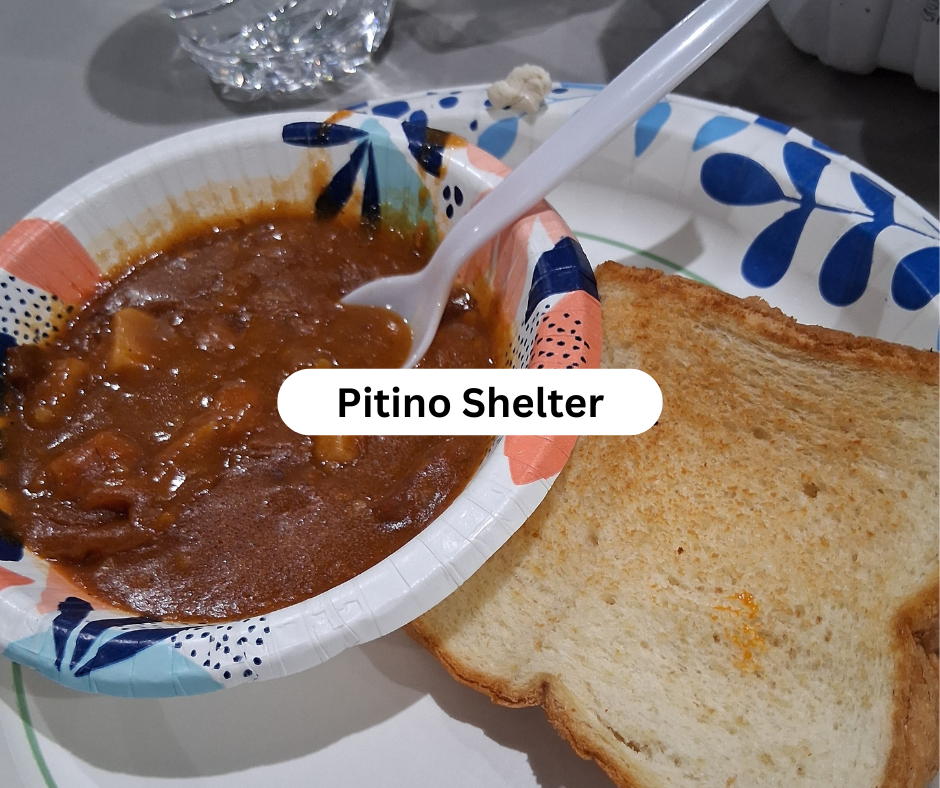
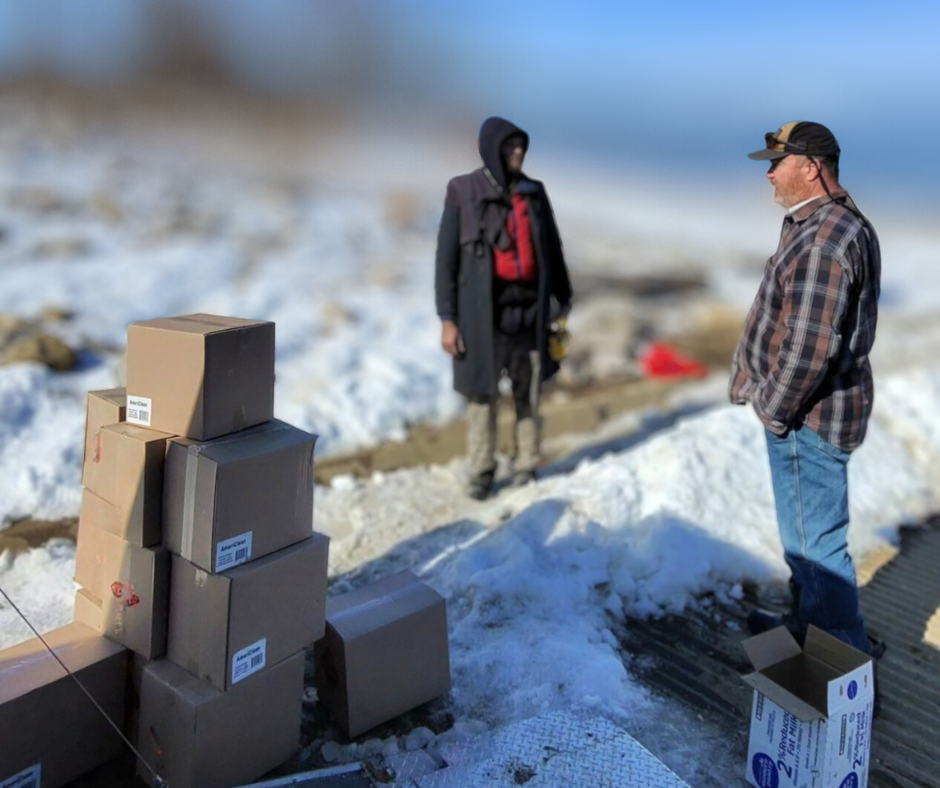
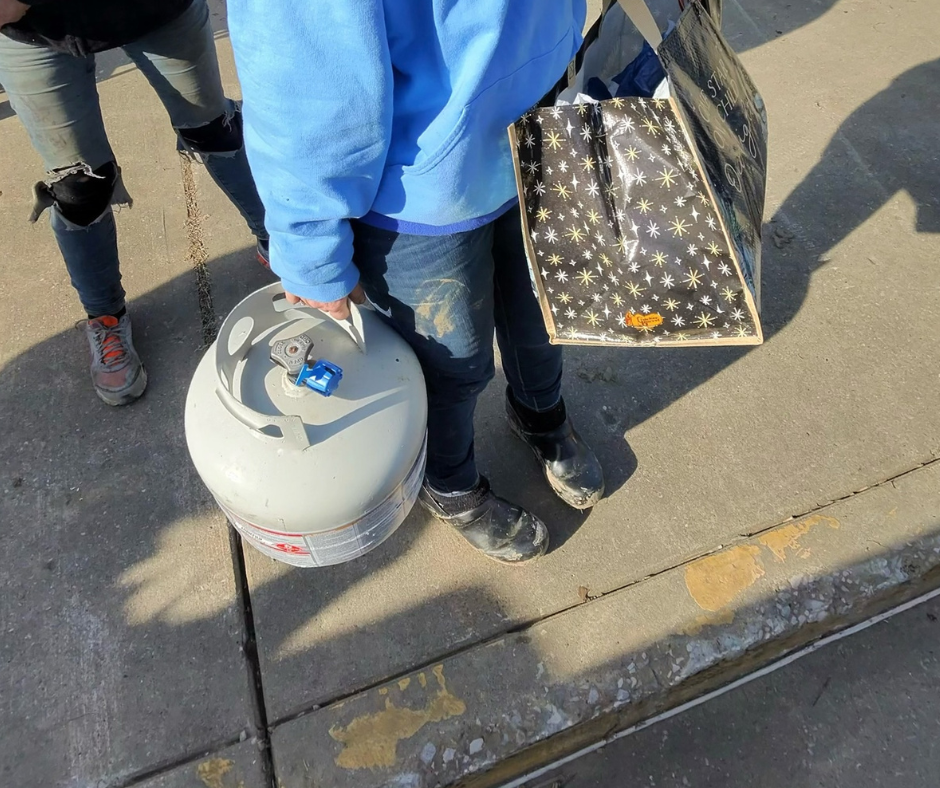
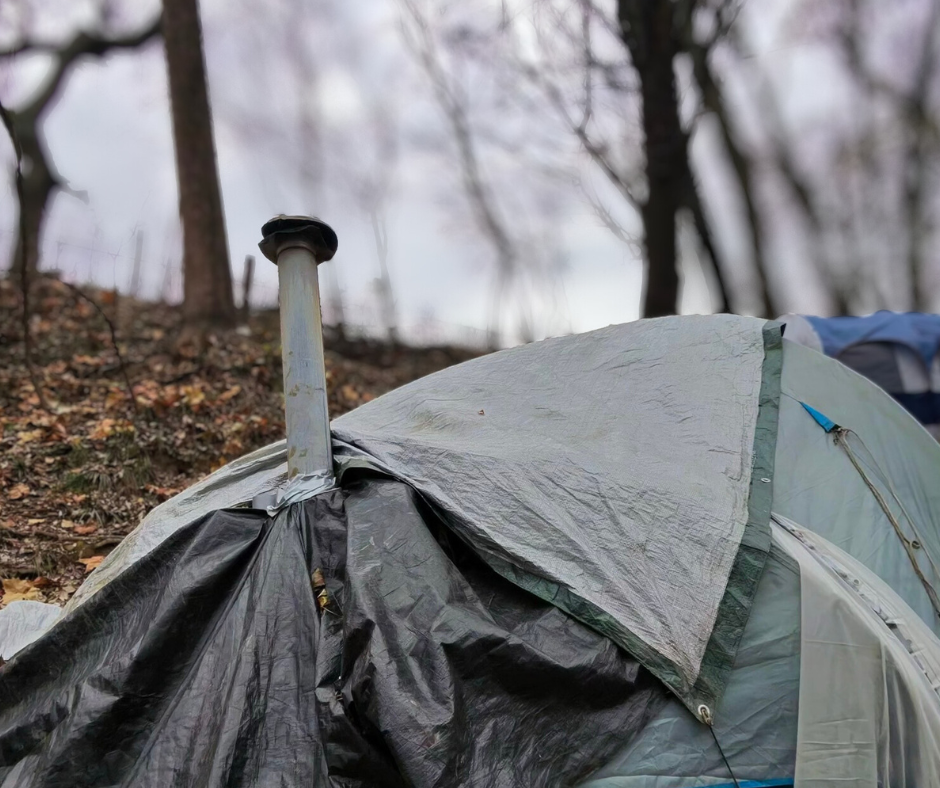
Very powerful and insightful brother.
There are many, many lessons to be gleaned from your experience both for you and for others who will hear this.
C. S. Lewis wrote “Good and evil grow at compounding interest. That’s why the little decisions we make each day have infinite importance. “ we can choose to “love our neighbor…” or look the other way.
Thank you for sharing your experience.
Coming from you, sir, that’s quite a compliment. Thank you for the wisdom before I got started.
Thank you for all you do. That was a awesome story. Thanks for sharing.
Yes sir, thank you for taking the time to read it.
For many years homelessness was a part of my life. The homeless know what it’s like to be looked down on, go without, and not receive a lot of help, and usually are eager to befriend and share. Sometimes it is easier to stay in that lifestyle and habits because they have to take care of each other. Sometimes their hearts get hardened by Christians and Christian originations, who are controlled by laws and rules. The Christian originations are sometimes numb to the same people always seeking help, or needing help, without many stories of ” I used the help available to pull myself out of the pits of my despair.” I’m sure the homeless stories are about the same across the nation caused by drugs and mental disabilities.
As Christians we are to plant the seeds of Christ, and hope of a better life, and let God do what he does. Unfortunately it is like the parable of the sower Matthew 13 :1-9.
I was addicted, homeless, on government benefits. I set my eyes on Christ, seeds planted from my childhood, got involved in my church, sobered up got a job and a place to live. The road wasn’t easy at least not at first. The temptation to go back to what I have always known. Knowing I would be accepted by others living the same lifestyle. Often times offered a couch, some food, a cigarette, drugs, alcohol, whatever the vice was.
Honestly if it wasn’t for people like you and my church doing whatever they can by spreading hope and love and taking a chance on someone trying to climb out of their mistakes I don’t know if I would be where I am. The light of Christ shining in the darkness through others allowing a narrow path to become seen! A hard path but definitely worth it. Looking back I can see God’s hand there the whole time. Please keep planting seeds and allowing God’s light to shine through you. Continue to build relationships and noticing the need for action. It’s not your good works but Christ’s works in you.
Brotherly love!
I hope you understand what I trying to say! And yes you can use this if you would like, or we could get together sometime and talk, you are a far better writer than me!
That’s beautiful that you would share that brother. I am so proud of that man you have become, and how you put the credit where it belongs. With our Savior. Love you.
This is so good to read. It is amazing that you were able to gain that kind of perspective. Looking forward to reading the next blog!
Do people read this? Just kidding. Seriously, thank you for those kind words.
Dave, I have had numerous contacts with homeless people. Some on the street, some at the Smothers Park, many at food kitchens and one that was a friend of a friend. My findings were that many choose to be homeless and pride themselves in asking people to give them what and are too lazy to work for. And that is directed from a lady that I had close contact with. She informed me that, ” her sister was a nurse and ran a nursing home in Bowling Green but that she chose to live the way that she did by asking other people to meet her every need”. She told me personally, ” I have no problem asking people for things. I’m not like my sister!” She had no intention of working for her own welfare when she could have everything given to her by others. And she didn’t. Another lady was highly educated and could have gotten a great job in management, but she chose the same lifestyle. She was a great writer and had managed a business but decided to live out of her van with her dog. She
on many occasions, she told me that it was “God’s will for others to support her.” I know Jesus as my Lord and Savior, and I’m pretty sure that the Word says, “If you don’t work, you don’t eat.” Both of these instances are inexcusable. They both had a good mind and could work, but they chose to beg rather than contribute to society in their own way.
Another encounter that I had was with a guy at Smothers Park. I walked there on a daily basis. One day, I was walking at 7 AM on a Saturday morning, and another young lady was walking toward me. I heard a guy screaming profanity at her. He was homeless and sitting in one of the swings at the entrance of Smothers Park on Veteran’s Blvd. Naturally, I turned to see where this was coming from, and he saw me glance in his direction, and then he lit into me and forgot about her. I FEARED for my life! I walked as fast as I could to get away from him. I climbed a wall to get to another street because I didn’t know if he was behind me or not, and I was too scared to look!
I got to the other street and ran 2 blocks to get to the courthouse. I could still hear this guy calling me every name under the sun. There was a firefighter standing outside in uniform. I told him what had just happened, and he went inside to tell the sheriff. I continued as fast as I could to my car, which was still 2 blocks away.
There is another young guy that I was told to never look at when you walk at the river. He is continually talking to himself, and I was told that you never want an encounter with him.
On the other hand, I worked at a food kitchen for a couple of years every Monday night and also worked with a clothing ministry for those in need for several years.
Another encounter was when I was in Savannah, and I handed a bag of food to a guy holding a sign saying he was hungry. I walked back past him after about 20 minutes only to see that he had thrown the bag, UNOPENED, into the trash can near him. There is a lot of abuse of the system. The sacks of new clothing that you see strewn all over Owensboro is because they don’t want it anymore. They will just go back and get more and throw it down, too. Someone else could use it and appreciate it.
If you can legitimately give a hand up, I’m all for it, but I find it hard to be empathetic to many of these instances. Just because they are homeless doesn’t mean that they are good people down on their luck. This doesn’t need to be supported as it is, but rather, it needs to be addressed to help people not to support bad behavior.
That’s profound. Thank you for taking the time for typing all that out. There’s a lot we can agree on.
What an incredibly beautiful heart you have! Sacrificing without asking anything in return… not even thank you. That was truly the heart of God.
Your story was both insightful and sad.
God bless you for trying to help. I’m ashamed I haven’t done more to help.
Perhaps I’ll find a way. Thank you, Dave.